UK’s Youth Mobility Scheme: Expanded Opportunities for EU Workers and Students
The UK government is considering a youth mobility scheme aimed at allowing young EU workers and students to live and work in Britain for up to three years. This initiative seeks to strengthen post-Brexit ties while maintaining controlled migration.
This potential scheme could enable tens of thousands of young EU citizens to work in the UK. Part of Prime Minister Sir Keir Starmer’s efforts, this initiative aims to reset relations with the EU. The proposed program would mirror existing agreements that the UK has with countries like Australia, Canada, and Japan.
Overview: Youth Mobility Scheme
The Youth Mobility Scheme (YMS) is a visa program designed for young individuals aged 18-30 from eligible countries. It allows them to travel, live, and work in the UK for up to two years. The scheme promotes cultural exchange and provides valuable international work experience.
A New Post-Brexit Opportunity?
Although Sir Keir has ruled out a return to free movement with the EU, reports indicate that UK negotiators are considering an “Australian-style” system. Under this plan, young EU citizens could stay in the UK for two years, with a possible one-year extension. In exchange, British citizens aged 18-30 would gain similar access to EU countries.
Key Features of the Proposed Scheme
- Annual Quota: The scheme may impose an annual cap on EU nationals, reportedly around 70,000. This aims to manage migration effectively but has drawn criticism from EU officials.
- Financial Requirements: Applicants must demonstrate financial self-sufficiency and pay an NHS surcharge, currently £776 per year. This ensures participants can support themselves, although some EU nations oppose these healthcare charges.
- No Access to Benefits: Participants cannot claim government welfare benefits, including unemployment support. This rule aligns with existing UK visa programs, ensuring that migrants contribute financially without burdening public funds.
- Reciprocal Agreement: The proposal includes reciprocal rights for UK citizens aged 18-30, allowing them similar work and residence rights in EU countries.
Challenges and EU Concerns
The proposal may face resistance from Brussels, especially concerning the annual cap of around 70,000 people. Several EU nations, including Germany, Poland, and Romania, have expressed concerns over the healthcare charges imposed on foreign workers.
An EU official criticized the UK’s stance, stating it is “offensive” to view Europeans as cheap labor rather than fostering better connections.
Political Reactions in the UK
Some politicians in the UK welcome the plan, viewing it as a step forward. However, others see it as a concession to EU demands. Lord Frost, the former Brexit negotiator, warned that this proposal could lead to alignment with EU standards and acceptance of European Court of Justice jurisdiction.
Conversely, Liberal Democrat MP James MacCleary praised the move, calling it a “victory for common sense.”
What’s Next?
EU leaders are scheduled to visit the UK on May 19 for further discussions on the scheme and broader UK-EU relations. While a final agreement remains uncertain, this proposal signals a potential shift in the UK’s approach to post-Brexit mobility and labor market policies.
Conclusion
If implemented, the youth mobility scheme could provide thousands of young EU workers and students with new opportunities in the UK and benefit British citizens seeking experiences in Europe.
However, crucial details—including the annual cap, financial requirements, and healthcare charges—must be resolved before any agreement is finalized. Attention now turns to the upcoming UK-EU summit to see how this proposal evolves.
Follow us on NewsNowGh.com to stay updated on the latest information regarding work permits, visas, and visa-sponsored employment.


